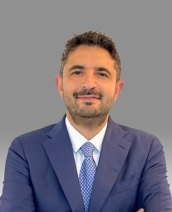Eddy Ghanem
Partner
Extensive expertise in Energy, Utilities, & Resources as well as in Technology & Innovation

Education
Past Experience

Eddy is a Partner in Arthur D. Little Middle East and is with the firm since 2010. He has 19 years of experience including 13 in Management Consulting and 6 years in the EPC industry. Eddy’s consulting experience has been focused on energy & utilities and technology & innovation, with recent focus on sustainability and industry / resources topics. Eddy has delivered multiple projects in both power and water covering various topics including assignments on energy transition, hydrogen, climate change, and digital transformation. Eddy has also worked on numerous assignments related to the development of national strategies, innovation strategies, as well as to the implementation of large transformation programs. Eddy has led large assignments in multiple countries covering diverse capabilities such as strategy development and implementation, organizational review and transformation, operations, due diligence, and technology / innovation. A selection of which is included below:
Supported a National Waste Center in development of national strategy and masterplan as well in development of regulations and technical guidelines
Supported a GCC National Research Entity in conducting a national foresight exercise to identify attractive future technologies in in energy, water, waste, and other sectors
Supported in developing the national innovation strategy for a GCC country
Supported a ministry in GCC in developing a sectorial innovation strategy
Supported ministry in GCC in the transformation of the industrial sector
Supported a leading GCC utility in setting-up and defining a strategic direction of a subsidiary focused on new areas such as Hydrogen, Storage, etc
Supported a leading GCC utility in developing a holistic digital transformation strategy
Supported a Net zero accelerator for a GCC country
Supported the development and implementation of several regional strategies in KSA

The kingdom’s growth engine

Technology foresight: anticipating future impact

GROWTH IN A NET ZERO WORLD


The National Innovation Ecosystem

Eddy is a Partner in Arthur D. Little Middle East and is with the firm since 2010. He has 19 years of experience including 13 in Management Consulting and 6 years in the EPC industry. Eddy’s consulting experience has been focused on energy & utilities and technology & innovation, with recent focus on sustainability and industry / resources topics. Eddy has delivered multiple projects in both power and water covering various topics including assignments on energy transition, hydrogen, climate change, and digital transformation. Eddy has also worked on numerous assignments related to the development of national strategies, innovation strategies, as well as to the implementation of large transformation programs. Eddy has led large assignments in multiple countries covering diverse capabilities such as strategy development and implementation, organizational review and transformation, operations, due diligence, and technology / innovation. A selection of which is included below:
Supported a National Waste Center in development of national strategy and masterplan as well in development of regulations and technical guidelines
Supported a GCC National Research Entity in conducting a national foresight exercise to identify attractive future technologies in in energy, water, waste, and other sectors
Supported in developing the national innovation strategy for a GCC country
Supported a ministry in GCC in developing a sectorial innovation strategy
Supported ministry in GCC in the transformation of the industrial sector
Supported a leading GCC utility in setting-up and defining a strategic direction of a subsidiary focused on new areas such as Hydrogen, Storage, etc
Supported a leading GCC utility in developing a holistic digital transformation strategy
Supported a Net zero accelerator for a GCC country
Supported the development and implementation of several regional strategies in KSA

The kingdom’s growth engine

Technology foresight: anticipating future impact

GROWTH IN A NET ZERO WORLD


The National Innovation Ecosystem
More About Eddy
- IE Business School in MadridMasters in Business Administration (MBA), Deans list
- American University of BeirutMasters of Engineering Management
- American University of BeirutBachelor of Mechanical Engineering, Deans list
- The Wharton SchoolGlobal Consulting Practicum
- Bechtel GroupSenior Mechanical Engineer
- Dar Al HandasahDesign Engineer
